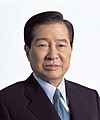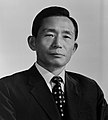Portal:South Korea
 |
환영합니다! / Welcome To The South Korea Portal!  South Korea, officially the Republic of Korea (ROK), is a country in East Asia. It constitutes the southern part of the Korean Peninsula and borders North Korea along the Korean Demilitarized Zone; though it also claims the land border with China and Russia. The country's western border is formed by the Yellow Sea, while its eastern border is defined by the Sea of Japan. South Korea claims to be the sole legitimate government of the entire peninsula and adjacent islands. It has a population of 51.96 million, of which roughly half live in the Seoul Capital Area, the ninth most populous metropolitan area in the world. Other major cities include Incheon, Busan, and Daegu. The Korean Peninsula was inhabited as early as the Lower Paleolithic period. Its first kingdom was noted in Chinese records in the early 7th century BCE. Following the unification of the Three Kingdoms of Korea into Silla and Balhae in the late 7th century, Korea was ruled by the Goryeo dynasty (918–1392) and the Joseon dynasty (1392–1897). The succeeding Korean Empire (1897–1910) was annexed in 1910 into the Empire of Japan. Japanese rule ended following Japan's surrender in World War II, after which Korea was divided into two zones: a northern zone occupied by the Soviet Union, and a southern zone occupied by the United States. After negotiations on reunification failed, the southern zone became the Republic of Korea in August 1948, while the northern zone became the communist Democratic People's Republic of Korea the following month. In 1950, a North Korean invasion began the Korean War, which ended in 1953 after extensive fighting involving the American-led United Nations Command and the People's Volunteer Army from China with Soviet assistance. The war left 3 million Koreans dead and the economy in ruins. The authoritarian First Republic of Korea led by Syngman Rhee was overthrown in the April Revolution of 1960. However, the Second Republic was incompetent as it could not control the revolutionary fervor. The May 16 coup of 1961 led by Park Chung Hee put an end to the Second Republic, signaling the start of the Third Republic in 1963. South Korea's devastated economy began to soar under Park's leadership, recording the one of fastest rises in average GDP per capita. Despite lacking natural resources, the nation rapidly developed to become one of the Four Asian Tigers based on international trade and economic globalization, integrating itself within the world economy with export-oriented industrialization. The Fourth Republic was established after the October Restoration of 1972, in which Park wielded absolute power. The Yushin Constitution declared that the president could suspend basic human rights and appoint a third of the parliament. Suppression of the opposition and human rights abuse by the government became more severe in this period. Even after Park's assassination in 1979, the authoritarian rule continued in the Fifth Republic led by Chun Doo-hwan, which violently seized power by two coups and brutally suppressing the Gwangju Uprising. The June Democratic Struggle of 1987 ended authoritarian rule, forming the current Sixth Republic. The country is now considered among the most advanced democracies in Continental and East Asia. (Full article...) Selected article -Radio jamming on the Korean Peninsula makes the border region one of the world's busiest places for radio signals. Medium wave jamming is dominant in the area including Seoul and the Korean Demilitarized Zone (DMZ). South Korea jams all radio and television broadcasts from North Korea, and until 2013 jammed all foreign broadcasts, which was ended during the Park Geun-hye administration. North Korea jams South Korean state broadcasts and foreign shortwave broadcast services which it believes to be against the North Korean regime. These include the Korean language service of the Voice of America, Free North Korea Radio (which originates from US transmitters in Guam), Radio Free Asia, and several other services and broadcasts. (Full article...)Selected image The Gold crown from Seobongchong Tumulus (Korean: 서봉총 금관; Hanja: 瑞鳳塚金冠; RR: Seobongchong geumgwan; MR: Sŏbongch'ong kŭmgwan), National Treasure of South Korea No. 339, is a gold crown of Silla origin that is now housed at the Gyeongju National Museum. More did you know -
In the news
This is a Good article, an article that meets a core set of high editorial standards.
Kim Ki-young (Korean: 김기영; October 10, 1919 – February 5, 1998) was a South Korean film director, known for his intensely psychosexual and melodramatic horror films, often focusing on the psychology of their female characters. Kim was born in Seoul during the colonial period, raised in Pyongyang, where he became interested in theater and cinema. In Korea after the end of World War II, he studied dentistry while becoming involved in the theater. During the Korean War, he made propaganda films for the United States Information Service. In 1955, he used discarded movie equipments to produce his first two films. With the success of these two films Kim formed his own production company and produced popular melodramas for the rest of the decade. Kim Ki-young's first expression of his mature style was in The Housemaid (1960), which featured a powerful femme fatale character. It is widely considered one of the best Korean films of all time. After a "Golden Age" during the 1960s, the 1970s were a low-point in the history of Korean cinema because of government censorship and a decrease in audience attendance. Nevertheless, working independently, Kim produced some of his most eccentric cinematic creations in this era. Films such as Insect Woman (1972) and Iodo (1977) were successful at the time and highly influential on the younger generations of South Korean filmmakers both at their time of release, and with their rediscovery years later. By the 1980s, Kim's popularity had declined, and his output decreased in the second half of the decade. Neglected by the mainstream during much of the 1990s, Kim became a cult figure in South Korean film Internet forums in the early 1990s. Widespread international interest in his work was stimulated by a career retrospective at the 1997 Pusan International Film Festival. He was preparing a comeback film when he and his wife were killed in a house fire in 1998. The Berlin International Film Festival gave Kim a posthumous retrospective in 1998, and the French Cinémathèque screened 18 of Kim's films, some newly rediscovered and restored, in 2006. Through the efforts of the Korean Film Council (KOFIC), previously lost films by Kim Ki-young continue to be rediscovered and restored. Many current prominent South Korean filmmakers, including directors Im Sang-soo, Bong Joon-ho and Park Chan-wook, claim Kim Ki-young as an influence on their careers. (Full article...)General images -The following are images from various South Korea-related articles on Wikipedia.
Did you know (auto-generated)
WikiProjectsSee WikiProject Korea for collaborating on South Korea topics, and more broadly, on all things Korea-related. South Korea topics
CategoriesAdministrative divisions of South Korea
Related portalsEast Asia Associated WikimediaThe following Wikimedia Foundation sister projects provide more on this subject:
Web resources
SourcesDiscover Wikipedia using portals |























































